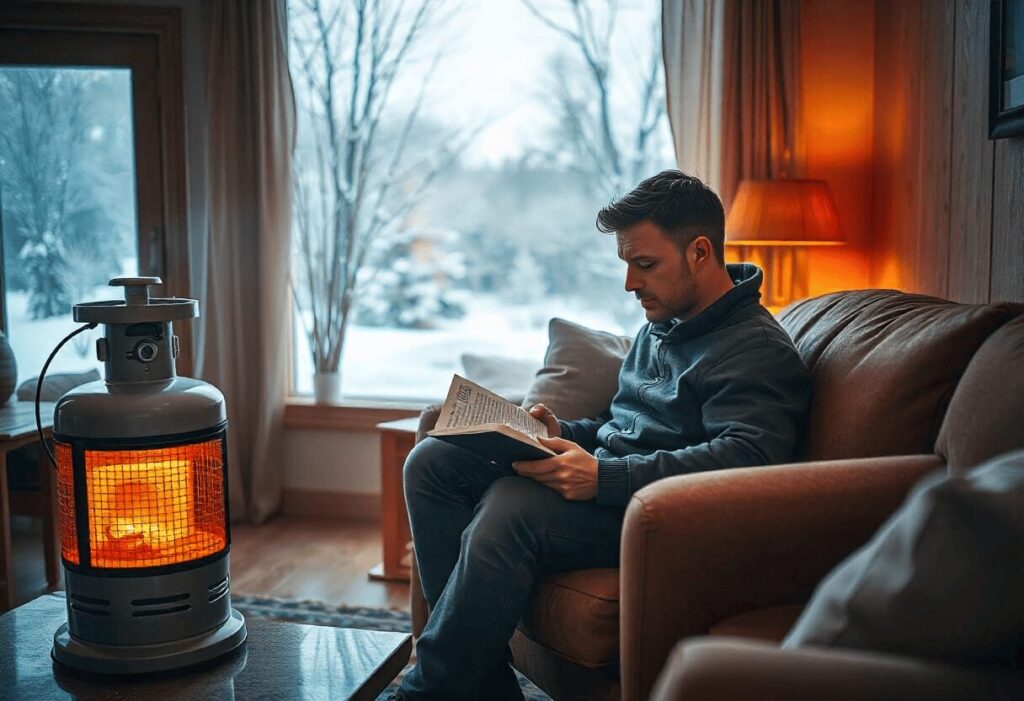There’s no one-size-fits-all answer to the question of whether it’s better to spring for propane or electric heating. Both types of heaters have their pros and cons, and the right one for you depends on your home’s specifications. As a veteran technician, I’ll explain how these heaters operate and compare their efficiency and heating capabilities, then weigh their pros and cons. You can also consider factors such as the installation, safety features, maintenance frequency of filters, life ratio, and noise level to help you make an informed decision.
How They Work
How Do Propane Heaters Work? The gas travels through a regulator and burns in a burner assembly that mixes the gas with air. This ignition creates a flame and heats a metal or clay on the outside, which then emits heat to warm the room. Starting: most models feature a piezoelectric igniter or an electronic ignition system that reliably sparks to ignite gas flow. Vent-free options use the oxygen in the room to fuel flames; vented options have a flue or exhaust system that removes combustion gases from your home, resulting in cleaner indoor air. Many propane heaters also have dials or adjustable valves on them that control the flow of gas, which means you have a say in how hot it gets.
Electric Heaters work by passing an electric current through a high-resistance material to produce heat. If a high-resistance element (usually made of nichrome wire) is used, the current flowing through it generates heat directly (reflector type) or with the aid of a fan (forced air). Most modern space heaters feature either ceramic elements or quartz tubes for efficient heat transfer, as well as enhanced safety, with ceramic elements self-regulating to prevent overheating. Heat is transmitted by radiation, convection, or a combination. Higher-end models also feature digital thermostat controls, which read the room temperature and then adjust the heater’s duty cycle to maintain a steady comfort level.
Efficiency and Heating Capacity
Propane Heaters. The efficiency of Propane Heaters is typically between 80% and 95%. However, some vented models may experience heat loss due to exhaust gases. They excel in drafts and high-ceiling rooms. They deliver from 10,000 to 40,000 BTUs per hour and are perfect for large workshops, garages, or patios. But while it’s often cheaper than electricity in some areas, the price of propane can also vary depending on demand and time of year.
They’re nearly 100% efficient at turning power into heat, but the cost can vary depending on your local electricity rate. Generally rated for between 500 and 1,500 watts (about equivalent to 1,700 to 5,100 BTUs), electric heaters perform best in small rooms without any major drafts; less so in larger spaces or those prone to cranky winter gusts. Their environmental impact depends on your local energy mix — they’re a greener choice in areas with lots of renewable electricity sources.
Pros and Cons
Propane heaters are high-capacity heaters ideal for larger, open spaces. They can be easily moved from one location to another, providing a portable source of heat that does not rely on electricity. They can also be used outdoors. However, they do require frequent refueling and the safe storage of propane tanks, and vent-free models can contribute to indoor air pollution and moisture. Furthermore, safety threats such as open flames or potential gas leaks need to be managed effectively.
Electric heaters are simple to operate and come in a plug-and-play type, with low maintenance that eliminates the need for messy fuel storage. They are also a much safer option for indoor use, as no combustion takes place. The downside is that they have less heating power for large or poorly insulated spaces, require electricity (which can be expensive and hard to come by during outages), and may take longer than their propane counterparts to warm a room.
Installation
No installation is necessary with these Propane Heaters; hook them up and enjoy fast, efficient heat where you need it most. (Standard 20lb tank not included) Permanent units may require professional installation to run gas lines, ventilation systems, and safety shutoff valves, because improper installation can be very dangerous. Adequate space around the heater is necessary to avoid fire hazards.
They’re easy-to-use electric heaters—plug them into a standard outlet and switch them on. For such hardwired or wall-plugged-in units, professional installation may still be needed to meet electrical codes and ensure safe use. It’s also a good idea to find models with overload protection and ground fault interrupters (GFIs) for safety.
Safety and Maintenance
Often, propane heaters have safeguards such as oxygen depletion sensors (ODS), which will power your heater off if the O2 levels get too low, and tip-over switches that stop current whenever the heater is knocked over. Routine maintenance includes checking hoses and connections for leaks (you can use soapy water to see bubbles at points of connection), cleaning burners and vents for efficient combustion, and storing propane tanks in a cool, ventilated space far removed from open flames.
Fixed heaters have safety features to ensure a safe home, including overheat protection that will turn off the heater if it reaches an unsafe temperature and tip-over protection for portable models. Maintenance involves ensuring the heater’s air intake and exhaust are free from dust and dirt, as well as periodically inspecting the power cord for signs of excessive wear. Insulate yourself against overloaded circuits by plugging it into a dedicated outlet.
Lifespan
With proper maintenance and care, it is possible to make your propane heater last up to 10-15 years; however, some parts, including burners, regulators, and igniters, may need to be replaced after a certain amount of time. Electric Heaters: Generally, 8-12 years average lifespan for electric heaters, ceramic and oil-filled models lasting longer. Both kinds can last longer with proper use and cleaning.
Noise Level
However, radiant propane heaters are quiet and suitable for use in tranquil places (fan-assisted models can make some noise). Electric heaters can run on low to make appealing white noise (a feature in models with a fan), or they can even run silently, as radiant and oil-filled warmers do, making them an ideal use for bedrooms and offices.
Other Features to Consider
Both propane and electric-powered heaters are available with adjustable thermostats for precise temperature control. Portability is also a factor to consider, and portable options are great in case you need to move the heaters around with you. A few electric heaters offer smart functionality, including Wi-Fi and app controls that allow for remote operation and monitoring, as well as scheduling setup.
While propane is a fossil fuel with its own set of emissions, electric heaters can follow your regional renewable energy mandates — if the right company supplies you. Lastly, be sure to look for safety certifications like UL (Underwriters Laboratories) or CSA (Canadian Standards Association).
Final Thoughts
If you want a heater for an off-grid cabin, large work shed, or on the deck or patio, there is no better option than propane heaters because of their portability and high heat output. But for smaller, insulated spaces or an easy and safe indoor option, electric heaters reign.
If propane or electric… comes down to your needs, budget, and preferences. Hopefully, this narrowest of deep dives helps you stay warm while making an informed choice for your needs.

